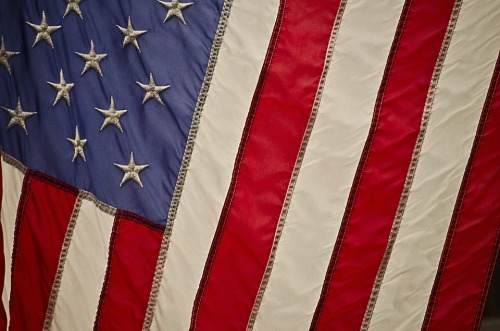

“I believe that this Nation should commit itself to achieving the goal, before this decade is out, of landing a man on the Moon and returning him safely to earth.” - John F. Kennedy.
On July 20, 1969, the US closed out the decade with astronauts walking on the surface of the moon. However, the Space Race between the United States and the Soviet Union had roots more than a decade before Neil Armstrong took his immortalizing first steps on the moon - and long thereafter. Help us celebrate the Moon Landing by brushing up on the history of manned space flight!

Why is Davy Crockett considered an American folk hero? Why is it common knowledge that someone saying “What did you just call me?” is a prelude to a fight? Why does passive behavior equate to not being a “real man”? It all comes down to the idea of honor.
A large part of contemporary America is based on honor culture, where members of a society organize their lives paying particular attention to maintaining and defending their reputation. While seeking to maintain one’s reputation is a common human interest across many cultures, the emphasis put on honor in certain parts of the United States is singular. It influences mental health and suicide, risk-taking and bravery, decisions regarding firearms, domestic violence and sexual objectification, reactions to terrorism, school shootings, presidential decisions to go to war, and even how parents name their babies. It is vital to examine this deeply intrinsic value placed on honor in order to truly understand America as a nation.
Image: Soldiers Military Attention Salute Uniform Usa by skeeze. CC0 Creative Commons via Pixabay.

“Typically the perceived political shortcomings of young people are framed as one consequence of coming of age in a flawed political system. This view is of the form that if youth grow up in a society in which effective governance is undermined by political polarization, which is true of the U.S. government in the second decade of the 21st century, then youth become disaffected and ideological as well. But this interpretation overlooks the possibility that youth can transform the system and do not passively internalize it. The remedy for the political ills of the country will not magically appear in some future election courtesy of a better class of leadership: it has to come from the demands and actions of better and more capable citizens…we believe that youth could be one source of this better citizenry that the country needs.”
The new year is approaching, and that means it is time for change. But what can be done to change the current state of American democracy? While some are waiting for change to come from within, trying to influence already polarized voters, or counting down the days until the “next election,” leading child and adolescent development experts Daniel Hart and James Youniss are looking to another solution: America’s youth.
Image: Bike, flag, water and summer by Frank McKenna. Public domain via Unsplash.
Happy birthday Neil Armstrong!

On 5 August 1930, America’s most iconic astronaut was born. Neil Armstrong’s legendary 1969 words, “That’s one small step for man, one giant leap for mankind,” have reverberated throughout the history of space travel.
Armstrong’s path to these words was always written in the sky: he gained his pilot’s license before being legally allowed to drive a car, and served as a Navy pilot in the Korean War. He spent seven years as a test pilot at the National Advisory Committee for Aeronautics, before joining NASA in 1962. Seven years later he launched into space aboard Apollo XI.
The world will always remember Neil Armstrong as the first man on the moon, but he saw himself differently: “I am and ever will be white socks, pocket protector nerdy engineer.”
Image: Portrait of Astronaut Neil Armstrong, commander of Apollo 11 mission by NASA. Public domain via Wikimedia Commons.
What Everyone Needs to Know Q&A: In March of 1917, The Jones Act granted Puerto Rican residents US citizenship but failed to clarify the island’s political status. 100 years later, we want to know:
What was the impact of extending US citizenship to Puerto Ricans?
The granting of US citizenship to the Island in 1917 has been one of the most influential decisions regarding the political future of Puerto Ricans. As Congressman William Jones (the sponsor of the Jones Act) argued in 1914, his proposed bill was primarily designed to ensure that the Island “remain a permanent possession of the United States.” The implementation of the Jones Act also had military implications. The US Congress approved the bill in March 1917 and a month later declared war on the German empire. During World War I, Puerto Ricans were required to register for military service, and 17,855 were drafted at the time, many of them to guard the Panama Canal Zone. Hundreds of thousands of Puerto Ricans have served in the US armed forces in all major US wars since then. Military service continues to be a major source of employment and upward social mobility for Puerto Rican youth today.
Originally an external imposition by Congress, US citizenship has become one of the ideological pillars of permanent association between Puerto Rico and the United States. Moreover, the discourse of rights is a powerful ideological justification for the Island’s complete annexation into the American union. Today, most Puerto Ricans recognize the material and symbolic value of US citizenship, including access to federally funded programs; unrestricted movement between the Island and the mainland; and protection of some of the civil, social, and political rights guaranteed by the Constitution of the United States.
What are the limitations of US citizenship for residents of Puerto Rico?
Puerto Ricans living on the Island cannot exercise the full range of constitutional rights as US citizens living in the mainland, such as voting for federal officials. However, they can do so if they relocate to one of the fifty states. Because all Puerto Ricans are US citizens by birth, they have the right of abode in the continental United States, Hawaii, and other overseas possessions of the United States. Since the early twentieth century, place of residence has determined the extent to which Puerto Ricans enjoy their rights as US citizens. This territorially grounded distinction in citizenship rights remains a defining characteristic of US colonialism on the Island.
[Page 48-49, Puerto Rico: What Everyone Needs to Know by Jorge Duany]
Images: 1) Flags by MiriamS. 2) San Juan by sjdents0. 3) Puerto Rico by grapesky. CC0 public domain via Pixabay.
Nuclear states: who has what?

As of January
2016, the United States maintained a stockpile of approximately 4,500 nuclear
warheads.
Over the next decade, the United States plans to
spend nearly $350 billion on modernizing and maintaining its nuclear forces and
the facilities that support them. In addition to these programmes, the US is
also planning significant redesigns of warheads for ballistic missiles. Despite
these plans, there is considerable uncertainty about how the US military will
pay for the modernization programmes.
Find out more about the nine nuclear states, their stockpiles, policies and future plans, with our interactive map from the SIPRI Yearbook 2016.
Image Credit: ‘US, Flags, Stars and Stripes’ by Unsplash, CC0 Public Domain via Pixabay.
New Books in New York. We’re looking at the beginnings of our country and doing some reflection on the past as we await the outcomes of the future.
Images by Priscilla Yu for Oxford University Press.
New Books in New York. With the interest of national security at heart, does the executive branch have a right to withhold information from the public? How much judicial deference is too much?
Images and GIF by Sara Levine for Oxford University Press.







